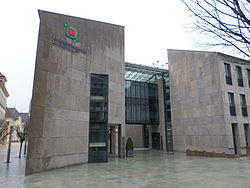 Logo since 2023 | |
 Headquarters | |
| Headquarters | Vaduz |
|---|---|
| Established | 1861 |
| Chairman | Georg Wohlwend |
| Central bank of | Liechtenstein |
| Currency | Swiss franc CHF (ISO 4217) |
| Website | www.llb.li |
 | |
| LLB | |
| Company type | Aktiengesellschaft |
| SIX: LLBN | |
| Industry | Banking |
| Founded | 1861 |
| Headquarters | Vaduz, Liechtenstein |
Area served | Austria, Liechtenstein, Switzerland, Germany, Dubai and Abu Dhabi |
| Total assets | CHF 97,000,000,000 (2024) |
| Total equity | CHF 2,200,000,000 (2024) |
Number of employees | 1286 (2024) |
| Subsidiaries | Liechtensteinische Landesbank (Österreich) AG LLB (Schweiz) AG |
| Website | www |
Liechtensteinische Landesbank AG, trading as LLB (stylised as llb), is a financial institution located in Liechtenstein, based in the capital city Vaduz. Since 1993 it has been listed as a company at the SIX Swiss Exchange, with the majority of shares (56.3%) owned by the Liechtenstein state. As the state is in a customs and monetary union with Switzerland and has adopted the Swiss franc as official currency, the monetary policy and money supply is the sole responsibility of the Swiss National Bank (SNB).
Contents
The LLB Group offers its clients wealth management services: as a universal bank, in private banking, asset management and fund services. With over a thousand employees, it is present in Liechtenstein, Switzerland, Austria, the United Arab Emirates and, since 2024, in Germany. As at 31 December 2024, the business volume of the LLB Group was 113.5 billion Swiss francs.
In addition to its primary operations in Liechtenstein, LLB also operates in Austria and Switzerland, Germany, Dubai and Abu Dhabi.